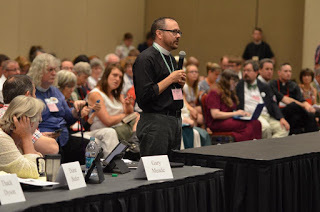 Cameron Partridge testifying in support of D036. Photo credit: the Living Church / Covenant magazine
Cameron Partridge testifying in support of D036. Photo credit: the Living Church / Covenant magazine What a whirlwind the last couple of days at General Convention have been. Friday the news of the Supreme Court’s decision blew through Convention like wildfire. People are absolutely jubilant. And then yesterday Bishop Michael Curry of North Carolina was elected the next Presiding Bishop of The Episcopal Church on a landslide, first ballot vote. He follows Presiding Bishop Katharine Jefferts Schori as a pioneer: she has been the first woman elected to this position, while he is the first African American. He is an firey, articulate preacher and evangelist, the kind of inspiring leader you want to get up and follow to the ends of the earth. Yesterday the House of Deputies also discussed C019 “Establish Response to Systemic Racial Injustice”. As Deputy Jennifer Baskerville Burrows wrote, “To hear a white member of the [Social Justice and U.S. Policy] committee say words to the effect of, “we have the chance to make race the centerpiece of the next triennium” signals a shift. If funded, resolution C019 will put real muscle (to the tune of $1.2 million) behind the work of racial reconciliation for both justice and mission strategy.”
Amid this intense, spirited movement, two of the resolutions that TransEpiscopal has been particularly tracking have also made their way through the open hearing process.
D037 came first. This is the resolution that calls for a study of the canons to clarify that and/or how people who have legally changed their name(s) can have their names amended in church records and registries and church certificates reissued. It came to the committee on Governance and Structure last night amid several other complex resolutions on the possibilities of restructuring aspects of our Church’s governance. To begin, the chaplain of the committee lead us in prayer and a hymn, one of my favorites: “God is love and where true love is, God [Godself] is there.” When our resolution came up, something like six or seven of us testified in support of it. No one testified against. We told stories of how we or people we know have been impacted in our full access to the life of the Church by not being able to change records in a consistent way, or to have certificates reissued. After we were finished, a number of deputies and bishops came up to us, thanking us for our testimony. As the Structure committee sifts through all the complexities of the restructuring resolutions, our stories were, as one committee member later related to me, very straight forward and incarnational. We hope it moves out of committee and to one of the houses quickly.
Then twelve hours later, at 7:30 this morning, we gathered again to testify in support of D036. This resolution, on “Adding a Name Change Liturgy to the Book of Occasional Services”, came to the Committee on Prayerbook and Liturgy. Once again we began and ended with prayer and song, and once more we had a great group of people prepared to testify. I am hoping that some of these folks will write about their experiences as well. I lead off my own testimony by recounting an experience I had in 2001 when I first claimed my name. I described how I passed a difficult night, sharing the name Cameron with loved ones. When I went to church the following morning and was asked to do the first reading, I had been stunned to find myself standing before the congregation reading the story of Jacob wrestling with the divine stranger who then gave him the name Israel. Flash forward several years, my testimony continued, to my years in parish ministry in which I had a trans parishioner who wanted to take on his chosen name in the context of the congregation. And so I put together a rite as a component of the Sunday liturgy, drawing in part upon the name change rite in Changes: Prayers and Services Honoring Rites of Passage that is the subject of D036. To be able to take up one’s name in the midst of one’s congregation, to be named and seen in that way, can be a profound recognition of the deep spiritual significance of embodying one’s name, I concluded. I was also struck that in addition to the other trans folks who testified—and, again, there were several powerful speakers – there were non trans ones as well, lifting up the flexibility of this resource to be used by many people. These were folks in a religious order who talked about the possibilities of claiming a new name in connection with religious life. This rite is additionally applicable to situations like adoption or divorce/remarriage. I especially appreciate that this resource came out of indigenous Episcopal congregations, communities that have long recognized the spiritual significance of names and particularly of taking on a new name later in life.
We now wait for D036 and D037 to go to their houses of origin. The name change liturgy resolution should first travel to the House of Bishops, while the name change canon study resolution should head to the House of Deputies. Meanwhile a number of resolutions related to liturgical marriage equality are coming forward to the Houses of Bishops and Deputies as well. Stay tuned on all of these fronts.
Amid all of this, the hymn from the beginning of the D037 hearing continues to echo in my ears: God is love and where true love is, God Godself is there.

 RSS Feed
RSS Feed